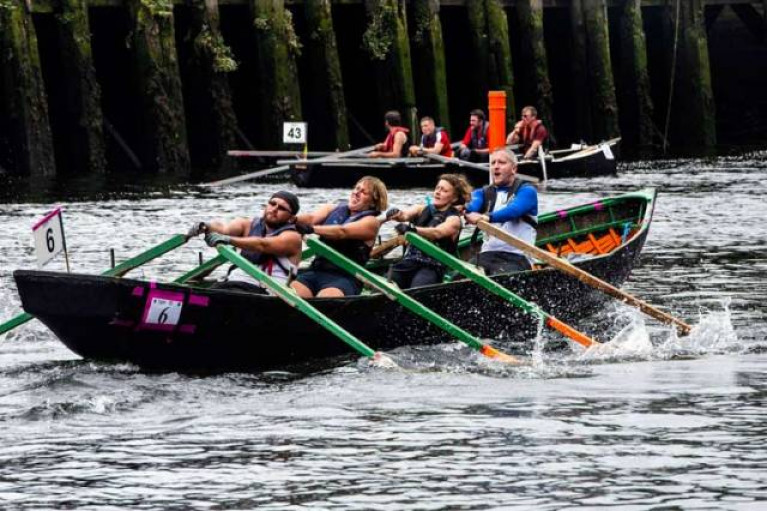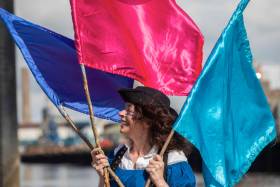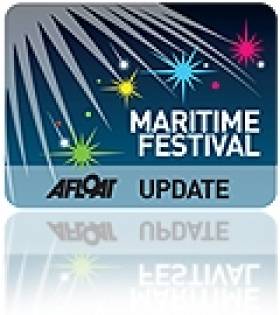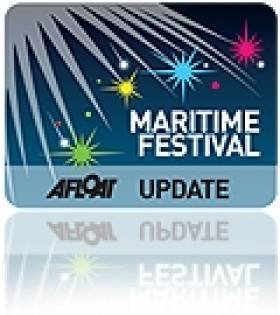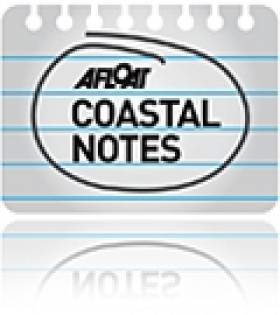Displaying items by tag: Ocean to City Race
550 Conquer 'Rás Mór' as Cork Harbour Ocean to City Festival Celebrates Prizewinners (Photos Here!)
There were huge congratulations to all 550 international and national participants who conquered the Rás Mór this year, the highlight of Cork Harbour's Ocean to City Festival.
Royal Cork Yacht Club was the centre of attention on Saturday as rowing craft of all kinds were launched in glorious sunshine in anticipation of the weekend's centrepiece event, An Rás Mór, Cork harbour’s Ocean to City race as Afloat reported here.
The coastal rowing event organised by the traditional boat group Meitheal Mara returned to the water this weekend after a break of two years due to the Covid-19 pandemic.
Prizewinners included Clarecastle Boys, and Fergus Currach Club, who won 1st Currach Ocean. Vartry Dragons were first in the Celtic Longboat, and Thames Dragon BC was first in the Dragon Boat on the Rocky Island Course.
Scroll down for a full list of winners below
 Best of Boat Worlds of Naomhóga Chorcaí, winners of the 1st Relay Crew on the Ocean Course of this year's Ocean to City - An Rás Mór. Photo: Andrei Scintian
Best of Boat Worlds of Naomhóga Chorcaí, winners of the 1st Relay Crew on the Ocean Course of this year's Ocean to City - An Rás Mór. Photo: Andrei Scintian
Cork Harbour Ocean to City Prize Winners 2023 (sub prizes)

 Thames Dragon Boat Club from the UK, winners of the 1st Dragon Boat of this year's Ocean to City - An Rás Mór. Photo: Andrei Scintian
Thames Dragon Boat Club from the UK, winners of the 1st Dragon Boat of this year's Ocean to City - An Rás Mór. Photo: Andrei Scintian
Cork Harbour Ocean to City Prize Winners 2023 (main prizes)

 Firth of Clyde Coastal Rowing Club from the UK, winners of the 2nd St Ayles Skiff on the Ocean Course of this year's Ocean to City - An Rás Mór. Photo: Andrei Scintian
Firth of Clyde Coastal Rowing Club from the UK, winners of the 2nd St Ayles Skiff on the Ocean Course of this year's Ocean to City - An Rás Mór. Photo: Andrei Scintian
 Vartry Dragons from Ireland and Wales, winners of 1st Celtic Longboat on the Ocean Course of this year's Ocean to City - An Rás Mór. Photo: Andrei Scintian
Vartry Dragons from Ireland and Wales, winners of 1st Celtic Longboat on the Ocean Course of this year's Ocean to City - An Rás Mór. Photo: Andrei Scintian
 The Mairead Kellys of Naomhóga Chorcaí, winners of the 1st Women's Crew and 1st Veteran Crew on the City Course of this year's Ocean to City - An Rás Mór. Photo: Andrei Scintian
The Mairead Kellys of Naomhóga Chorcaí, winners of the 1st Women's Crew and 1st Veteran Crew on the City Course of this year's Ocean to City - An Rás Mór. Photo: Andrei Scintian
From Gigs to Skiffs to Canoes - Ocean to City Boats Compete in Cork Harbour Long Distance Rowing Race (Photo Gallery)
Royal Cork Yacht Club was the centre of attention on Saturday as rowing craft of all kinds were launched in glorious sunshine in anticipation of the weekend's centrepiece event, An Rás Mór, Cork harbour’s Ocean to City race.
The coastal rowing event organised by the traditional boat group Meitheal Mara returned to the water this weekend after a break of two years due to the Covid-19 pandemic.
The multi-craft rowing and paddling race has attracted a fleet of over 200 boats.
 Crosshaven is the official start venue of the main fleet in the Ocean to City Race 2023
Crosshaven is the official start venue of the main fleet in the Ocean to City Race 2023
Now in its 18th year, the all-inclusive rowing event welcomes traditional wooden working boats, gigs, skiffs, sloops, lifeboats, longboats, cutters and currachs, kayaks, canoes, ocean sliding-seat boats and stand-up paddleboards as depicted in Bob Bateman's photo gallery below.
Billed as Ireland's largest long-distance rowing and paddling race, Ocean to City has four-course distances to choose from across the 28 km course - as in two, seven, 12 and 15 nautical miles, all finishing in Cork city centre.
Ocean to City Rowing Race in Cork Harbour 2023 Photo Gallery
Ocean to City Set for June 3rd in Cork Harbour
Cork Harbour's Ocean to City race is taking entries from February 15th for its 19th annual event on June 3rd.
Over 500 people participated in last year’s event, which returned after a two-year break due to Covid-19.
The all-inclusive rowing event welcomes traditional wooden working boats, gigs, skiffs, sloops, lifeboats, longboats, cutters and currachs, to kayaks, canoes, ocean sliding-seat boats and stand-up paddle boards.
Ocean to City has four-course distances to choose from, 2nm, 7nm, 12nm and 15nm - all finishing to “a jubilant welcome in Cork’s city centre”, the organisers state.
The race or row is an integral part of Cork Harbour Festival, which takes place from June 2nd to 11th with over 50 events in 15 locations across Cork city and harbour.
The ten-day “celebration of maritime culture” promises a programme of on-the-water activities, history, music, art, workshops, talks and walking tours and family events.
Early bird deals and ferry discounts will be available for registering from February 15th.
Full details here
Ocean to City Race Set for June 4th in Cork Harbour
An Rás Mór, Cork harbour’s Ocean to City race, returns to the water this June after a break of two years due to the Covid-19 pandemic.
Registration will open on March 1st for the multi-craft rowing and paddling race set for June 4th, 2022.
Now in its 18th year, the all-inclusive rowing event welcomes traditional wooden working boats, gigs, skiffs, sloops, lifeboats, longboats, cutters and currachs, kayaks, canoes, ocean sliding-seat boats and stand-up paddleboards.
The last ”in-person” event attracted 600 participants in over 200 craft, a third of which came from abroad, the organisers state. The virtual events over the past two years involved over a dozen countries across four continents, they state.
Billed as Ireland's largest long-distance rowing and paddling race, Ocean to City has four-course distances to choose from across the 28 km course - as in two, seven, 12 and 15 nautical miles, all finishing in Cork city centre.
Budding participants are advised to check the terms and conditions of travel and accommodation arrangements.
This is “just in case Covid forces us to change tack”, the organisers state.
A “spot the boat” brochure has been published, and early bird deals are available. More details of this and registration are on the website here
Cork Harbour Festival & Ocean to City 2020 Fall To Covid-19
Cork Harbour Festival and the Ocean to City Race have taken the decision to cancel this year’s events. The festival was due to take place 15 May – 8 June, with the flagship Ocean to City – An Rás Mór on 6 June.
The aim is to reschedule the Cork Harbour Festival and Ocean to City next year, in partnership with SeaFest 2021.
It is worth noting organisers were preparing for the biggest Cork Harbour Festival and Ocean to City to date, with a record number of events as well as early bird race entries.
Next year’s Cork Harbour Festival will take place 5 – 13 June 2021, with the Flagship Ocean to City on 5 June, and we look forward to welcoming you back then.
Cork Harbour Festival is sure to make a big splash this June Bank Holiday Weekend.
And the festivities are only beginning on Saturday 1 June, with nine days celebrating all things maritime taking over Leeside and Cork Harbour — for those with their sea legs and landlubbers (or land lovers) alike.
The showcase event that draws huge crowds every year is Ocean to City – An Rás Mór.
The race is the largest of its kind in Ireland and attracts competitors from all over Europe and as far as the USA.
The 200-strong fleet will give spectators a chance to see an array of vessels from traditional wooden boats, currachs and gigs to Chinese dragon boats, kayaks and even stand-up paddleboards.
The race starts in Crosshaven at 10.30am on Saturday and there will be free family entertainment, music and food at some of the best viewing points along the race route at Cobh, Passage West, Blackrock Pier and the city centre.
If you’re feeling energetic, you can cycle alongside the fleet for part of the racecourse from Father O’Flynn Park in Passage West.
Or you can get caught in the rhythm at the Port of Cork with a 14ft drum for all to play – no experience of drumming necessary.
Take your place at the finish line at Lapp’s Quay with live race commentary from Cork’s 96FM and food stalls, street performances, balloon artists, DJs, drummers and much more to keep you entertained while you welcome the participants as they complete this spectacular race.
If you prefer to stay on dry land, you’ve so much to choose from – with Camden Fort, Elizabeth Fort and Spike Island all open for tours every day of the Bank Holiday weekend.
As the sun sets there will be some very special performances happening including the Johnny Cash Tribute on Spike Island on Saturday evening, and a swashbuckling concert performance of The Pirates of Penzance on Sunday at Cork Opera House.
Most of the festival events are family friendly, making this the ideal way to have some great waterside adventures with the kids (and the young at heart!)
There’s everything from children’s storytelling in Passage West Library to Cobh Harbour tours.
Bring your trainee pirates to the Circus Factory on Saturday for some pirate circus training, or get the whole family team working together for orienteering on Sunday and Monday with Bishopstown Orienteering Club.
Join the ‘3 For the Sea’ Beach Day in Myrtleville on Sunday, or being bidding artists to the Crawford Art Gallery on Monday for a family-friendly art workshop and tour.
But no Cork Harbour Festival would be complete without a chance to get out on the water.
SailCork in East Ferry have an open day on Bank Holiday Monday, and you can try sailing at the world-famous Royal Cork Yacht Club with free tasters on Sunday.
With a weekend packed full of water-based activities, you can brave a high-speed harbour tour, paddle, kayak, sail, surf or SUP your way through the weekend.
Get all the details of the full festival programme with over 70 events on CorkHarbourFestival.com.
#OceantoCity – The winner of this year's 10th Ocean to City Rowing Race 'An Rás Mór' went to the brand new Dalkey community built currach Naomh Beagnait which was only launched at the start of June, writes Jehan Ashmore.
Naomh Beagnait (see photo) was competing in the event which attracted 500 rowers amongst some 120 craft including overseas entries in a celebration of Cork's maritime heritage.
The Dublin Bay based currach was constructed in Dalkey over the month of May and is based on the racing currach design from Inishbofin Island.
"To each person who sawed, sanded, steamed, donated money, encouraged, baked cakes, publicised, wrote articles, followed us on facebook, blessed the boat, you were a winner on Saturday in Cork" said Liz Murray who had the vision behind the Begnet's Boat Project.
She added "especially thanks to Dalkey Rowing Club who came to our rescue only a fortnight before Mark Redden who led the boat-building trainee team which used their boatshed. A true community effort by all involved".
Redden who is based in Barcelona and his Catalan rowers led the 7m (22ft) currach to victory with the 1st Ocean Race but also taking honours in the 1st Currach Ocean category representing Base Náutica de Barcelona (Repararems).
Naomh Beagnait will take centre-stage next Saturday (15 June) at The Inaugural Dublin Currach Regatta (2.30pm - 7pm) at the East Wall Water Sports Group in Clontarf and where the free event is sponsored by the Dublin Port Company.
Take in the sights and sounds of this most traditional of boating events at the Tolka Estuary, off the Alfie Byrne Road. Presentations will take place in the Poolbeg Boat and Yacht Club, Pigeon House Road, Ringsend on the south side of the Liffey.
Currach racing at National League Level are to be held on the previous day, Friday (14 June) for details visit this link.
#OceantoCity – Today's Ocean to City Race 'An Rás Mór' involving 122 entries can be viewed live on the big screen along Cork's Lapp's Quay thanks to Cork City Council.
The live-stream is also available from www.corkcity.ie/tv starting from 12 noon onwards so tell your family and friends!
The 28km rowing race which first began in 2005 is the highlight of the 10-day Ocean to City Maritime Festival that celebrates Cork's unique maritime heritage and attracts entries from all over the world.
The course begins at Crosshaven and crosses Cork Harbour via Cobh, Monkstown, Passage and Blackrock before reaching the finish line at Lapp's Quay.
An expected 500 Irish and international rowers will compete in a diverse range of vessels including currachs, Irish coastal rowing boats, Bantry longboats, kayaks, Cornish pilot gigs and Chinese dragon boats.
Among the participating currachs is the brand new Dalkey built Naomh Beagnait which as previously reported on Afloat.ie was a community led project which saw the 22ft craft make her maiden voyage only last weekend.
Maritime Movies Make Waves at Ocean to City
#MaritimeMovies - As part of the Ocean to City Festival (1-10 June), this Thursday there is a Maritime Movie Night starting at 19:30 in Cork's Half Moon Theatre.
The theme of the cinematic evening is oceanic adventures and stories from the sea. So sit back, have a drink, and watch the old classic Moby Dick (1956) as well as a series of archive shorts. Swap tales of seafaring and get inspired by the weird and wonderful world of maritime filmmaking.
The Irish Film Institute (IFI) is proud to work with Ocean to City to present a specially tailored programme of oceanic delights from the institute's national film archive, including: animated films, documentaries and newsreels dating from the 40s to 70s which celebrate man, the sea, and other bodies of water.
Among them there is a fascinating selection made in and around Cork. B & I - Motorway to Ireland (1968), Baid Solais - Light Ships (1957), 2000 Miles of Peril (1974), Blackwater Holiday (1963) and Moby Dick (1956)
An entry of €8 (available on the door) and pre-sales are also available from the Cork Opera House.



























